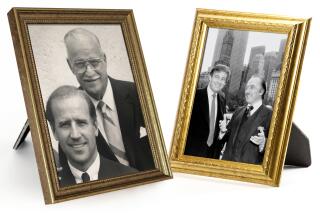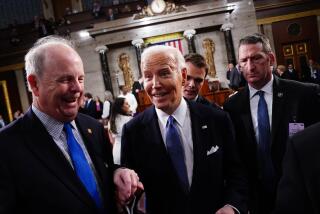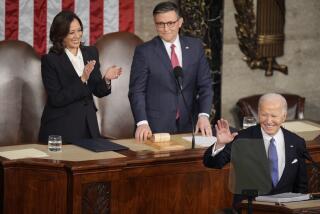Read Bush’s Lips: He’s Not His Father
WASHINGTON — As President Bush prepares for his first State of the Union address Tuesday night, the speech looms as his best opportunity so far to drive home the main message he has sought to convey in recent weeks: He is not, at least politically, his father’s son.
If there is one scenario that haunts this White House, it is the trap that ensnared George H.W. Bush, the 41st president. His popularity soared as U.S.-led forces quickly triumphed in the 1991 Persian Gulf War, much as the U.S. military successes in Afghanistan have propelled his son to sky-high poll ratings. But the elder Bush went on to lose reelection in 1992, driven out of office not only by an economic recession but by the impression that he was insufficiently concerned about the plight of suffering Americans.
The younger Bush and his top aides “all learned from 41, and they’re running scared,” said a Republican lobbyist who is close to the Bush family and works with the White House staff.
Since the new year began, Bush has traveled from coast to coast, stressing his commitment to getting the economy back on track, in settings ranging from a town hall meeting in Ontario, Calif., to a machinery factory in West Virginia. He will offer more of the same in the State of the Union address to a joint session of the House and the Senate before a nationwide television audience.
“The president is going to talk about the need to help protect America’s workers and to create jobs and have a strong economy,” White House Press Secretary Ari Fleischer said recently.
A senior White House aide elaborated, saying Bush will promise to attack the nation’s economic problems with “the same commitment and vigor” that has guided the war in Afghanistan.
The president is likely to expand on the economic themes in a second, more detailed address in early February, White House officials said. And he will continue to look for opportunities to emphasize his push for developing additional domestic sources of energy, portraying that policy as an important element of national security.
Not surprisingly, the overarching theme of the State of the Union address will be the need to protect the security--economic, domestic and overseas--of a nation facing new threats at the start of the 21st century.
Personifying the American effort, Hamid Karzai, head of the interim government in Afghanistan, who will meet Bush at the White House today, is a likely presidential guest Tuesday in the Capitol.
Asked whether the administration could tackle the range of domestic and international security issues on its agenda, Andrew H. Card Jr., the White House chief of staff, said during an appearance Sunday on NBC’s “Meet the Press”: “We’re committed. We can walk and chew gum at the same time.”
Among the troublesome topics for Bush to tackle in the speech is the Enron bankruptcy; the White House is working hard to prevent the fallout of the energy company’s controversial collapse from damaging Bush’s standing. Officials were debating last week whether to refer to it only obliquely by raising proposals to protect Americans’ pensions.
Bush has revealed some of his specific recommendations for the security effort. He announced last week that he would seek $38 billion for homeland security, doubling the current funding, and that he wants to give the Pentagon its biggest spending boost in two decades--a 14% increase, totaling $48 billion.
A poll conducted earlier this month by the Pew Research Center underscored the chance Bush has to successfully promote his agenda Tuesday night: 54% of those surveyed said the address this year will be more important than such speeches in past years.
That interest, said poll director Andrew Kohut, is the result of the public’s uncertainty about the war on terrorism and the future of the economy, as well as a reflection of a newfound belief that what takes place in Washington matters.
“The public is going to be more open to him and listening harder,” Kohut said. “This would suggest it could have more of an impact. It’s a great opportunity for him.”
Responses More Mixed on Economy
That is the good news for Bush in the survey.
There is mixed news in the response when those polled were asked about the economy--46% said Bush “could be doing more” to improve the economy. Although that is clearly a cloud on the political horizon for Bush, it is far better than the 76% who, a decade ago, said his father could have been working harder on economic issues.
Analysts say the president has some advantages that could help him avoid his father’s political downfall. Unlike the Gulf War, which had a distinct beginning, middle and end, the campaign against terrorism will dominate not only his presidency, but U.S. life well into the future.
Politically, that could help Bush convert wartime popularity into postwar political success, something that eluded not only his father but such others as President Wilson and British Prime Minister Winston Churchill.
“It’s very hard to translate military success into ongoing political strength,” said Benjamin Ginsberg, a professor of political science at Johns Hopkins University in Baltimore. “Once the war is over, it’s over. But now it’s different.
“This is a non-ending war. The president can wrap himself in the flag on an ongoing basis because the war has to be continually fought at home, and the reality is some group of terrorists will always try to do something. All it takes is one crazed guy trying to light his shoes for the president to remind us who is protecting us.”
Also working for Bush: The Republican Party is not divided as it was in 1992, when the GOP’s conservative wing was angered that his father had broken his pledge not to raise taxes.
According to senior White House aides, the State of the Union speech has been crafted over several weeks, beginning with talks Bush held with counselor Karen Hughes at his Texas ranch during the holidays.
From those discussions came a series of drafts by chief White House speech writer Michael J. Gerson. He has been spotted in recent weeks at two different Starbucks and an upscale sandwich shop within walking distance of the White House, writing away on a yellow legal pad.
There was more work in the quiet of Camp David, the presidential retreat in Maryland’s Catoctin Mountains; further revisions by Hughes during two intensive days last week and then, beginning last Thursday, rehearsals by Bush with a TelePrompTer. Those sessions led to more presidential editing to transform his writers’ prose into his own more straightforward style.
The more common touch that Bush favors is another advantage he has over his father, said Leo Ribuffo, a history professor at George Washington University in Washington.
Even if economic problems worsen, “he won’t look like a man to the manor born,” Ribuffo said. “His accent is part of it. He has cultivated his Texas-hood.”
More to Read
Get the L.A. Times Politics newsletter
Deeply reported insights into legislation, politics and policy from Sacramento, Washington and beyond. In your inbox three times per week.
You may occasionally receive promotional content from the Los Angeles Times.










